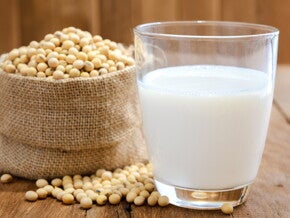
Developing a Healthy Digestive System by Including Probiotics in Your Child's Diet
There are billions of bacteria living in our digestive system. Some types of bacteria provide us with health benefits, such as Bifidobacteria and Lactobacillus that are present in the gastrointestinal microflora, while others, like Escherichia coli (E. coli) and Salmonella, can be harmful.
Probiotics help to maintain a healthy digestive system, with a healthy balance of ‘good’ and ‘bad’ bacteria in our body.
HOW ARE PROBIOTICS DIFFERENT FROM PREBIOTICS?
Both prebiotics and probiotics work to bring about health benefits in the body by increasing ‘good’ intestinal bacteria in different ways. Prebiotics are fibres that provide nourishment for ‘good’ bacteria probiotics, to flourish and grow in the digestive tract.
On the other hand, probiotics are live bacteria that are good for your health, especially your digestive system - it travels into the digestive tract and promotes the growth of healthy bacteria. Probiotics are often called ‘good’ or ‘helpful’ bacteria because they help keep your gut healthy.
COMMON MISCONCEPTIONS REGARDING PROBIOTICS
MYTH: The strain doesn’t matter
FACT: Yes, it does. Your child’s gut is a hostile place. Only certain strains of bacteria can survive in that harsh environment. Each unique strain has its benefits and drawbacks, make sure you are providing the right one for your child. Look out for the ones with Bifidus strains!
MYTH: Probiotics, the more the better?
FACT: It depends. The real question is, what kind of probiotics and how much of it is better for your child. Health benefits conferred by probiotic are strain specific. You can consult your doctor on the type of probiotics recommended for your child to improve gut health. Different types of probiotics will require a specific amount for consumption to ensure efficacy.
DOES MY CHILD NEED PROBIOTICS?
Having a good balance of ‘good’ and ‘bad’ bacteria is important for a healthy digestive tract as it may help to reduce the incidences of intestinal discomforts such as diarrhoea.
Every child has a different mix of bacteria, both ‘good’ and ‘bad’, in their intestinal tract during birth. However, several factors could cause an imbalance of ‘good’ and ‘bad’ bacteria, such as consumption of antibiotics and the child’s diet which might reduce the ‘good’ bacteria.
This imbalance may increase a child’s likelihood of falling ill or developing allergies due to a less optimum immune system and disturbed gut microflora. Hence, having probiotics helps to increase the population of ‘good’ bacteria.
WHERE CAN I GET PROBIOTICS?
Probiotics can be sourced from fermented foods and beverages, and even some supplements. Probiotic-rich foods are yoghurt, cheese, kimchi, miso, kefir, buttermilk, tempeh and sourdough bread.
Of course, your child’s biggest source of probiotics will come from his milk. That’s why NANKID OPTIPRO is formulated with 100 million Probiotic B. lactis+, which helps reduce the risk of infections while supporting growth and development.
WHAT COMES NEXT?
Ask your healthcare professional for advice. Milk with added probiotics may benefit your child as it helps to maintain a desirable balance of protective good bacteria in your child’s gut.
^Compared to Key Formulated Milk Powder for Children aged 1-3 years per 100g of milk powder (as of March 2024) +Refers to 100 million Probiotic B. lactis per 100g of milk powder
A strong immunity is an important foundation for your child’s growth, as it enables them to learn and develop healthily. That’s why NANKID OPTIPRO is formulated with Immunity Guardians* – which consist of 2’-FL Oligosaccharide^ and Probiotic B. lactis. These Immunity Guardians work together to defend the body against harmful bacteria while promoting the growth of good bacteria, which helps reduce your child’s risk of infections.
NANKID OPTIPRO is the only brand with the highest levels of 2’-FL Oligosaccharide^ and 100 million Probiotic B. lactis+.
*Immunity Guardians refers to 2'-FL Oligosaccharide & Probiotic B. lactis to support immune foundation
^Compared to Key Formulated Milk Powder for Children aged 1-3 years per 100g of milk powder (as of March 2024)
+Refers to 100 million Probiotic B. lactis per 100g of milk powder






















